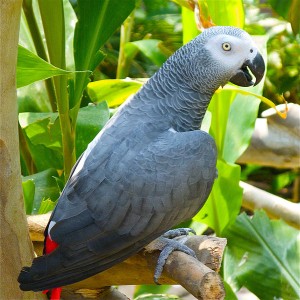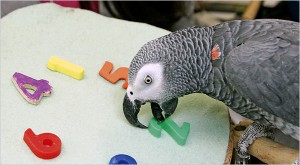For years I have been fascinated with some species of bird’s ability to copy noises. Some people are tricked by the noises that birds can make, ranging from sounding like a human to the ring of a telephone. I have always wondered how some birds mimic people, animals and even sounds caused by inanimate objects. But not only do I ask myself why, but how are they able to do this?

One species, the parrot, is well is well known for learning how to speak by their human owner. A parrot produces lower notes, when singing, compared to other birds. This gives them the ability to better mimic human voices. In order for a parrot to do this they must have great muscle control and excellent memory in order to produce such sounds. As stated by the leader of this research, Irene Pepperberg, “Alex has a zero-like concept; it’s not identical to ours but he repeatedly showed us that he understands an absence of quantity.”
Birds also use this ability a lot in the wild. Like us, birds are able to pick up on local dialects. This can help a male and female to recognize that they are from the same area. Sometimes they use it to avoid one another. But it is shown in playback studies that wild parrots react more to their local tongue. A reason for parrots to imitate is to control the attention of an audience by making sounds that the listener already has a memory of. Some of these calls are towards one receiver.
One of the most intelligent species of bird is the Gray Parrot. One Gray Parrot, Alex (died 2007), was as smart as a three or four year old. Alex was capable of two-way communication and had a vocabulary of about 150 words. He could grasp concepts that some children could not, such as the concept of “zero”.

There were also more experiments conducted with Alex that pretained to his grasping of the zero concept. When Alex’s tray was cleared he had responded with the word “none”. The scientists had done more trails, hoping to see if Alex actually understood the meaning of “none” and “zero.” Each and every time Alex was able to identify the zero quantity.
Ecologist Daniel Sol and biologist Trevor Price discovered that animals’ brains are relative to their body size. So, animals have skills that allow them to change their behavior with to their surroundings. Birds are an exception. Their body size is smaller, so it would be expected for them to have tinier brains. But most species of birds’ have brains that are much larger than what they would thought be. Several types of birds that are a part of that are woodpeckers, parrots and owls.
So how many different species of birds are able to do this? How did birds get started with mimicking noises? Why did they decide to start?
Savana, I really liked your blog. It was very well written, but make sure to check for some grammatical errors. Also, when you quoted Dr. Pepperberg, it was not related to the paragraph it was in. It is important to finish your thoughts that the paragraph is about and introduce new ideas in the next. With that said, I have been volunteering at the Center for Avian Adoption, Rescue and Education in Fargo for about three months. It has taught me a lot about birds just like Alex, and I have developed a passion for them. I have also done quite a bit of research, including reading Parrots for Dummies cover to cover. Like McCall and Jamee have mentioned, most parrots mimic one another and different animal calls in the wild to communicate to each other various things. But in captivity, it is an entirely different story. Most of the time these parrots mimic words to get our attention. They are very social creatures and will do anything to trick us into a nice head scratch. There’s a blue and yellow macaw at C.A.A.R.E. named PJ who talks quite a bit. Like most of the parrots there, he has been abused in the past and has learned some naughty words. When you are in the room and attending to a different bird, he becomes jealous. He knows that if he screams “SHUT UP!” you will notice him. We work with him constantly to build his self-esteem into better phrases such as “I LOVE YOU”. This behavior is much different for another bird, Chance, an umbrella cockatoo. He is actually quite quiet most of the time, and usually only whistles. But when he is with a caregiver, getting a loving snuggle, his words come out loud and clear, “HELLLOO CHANCE; I LOOVE YOU”.
http://www.caare.net
I found your article very interesting. Mostly how this bird, Alex, can understand the concept of zero and the meaning of none. I researched the question you had about “Way did they decide to start mimicking things?”
Parrots started mimicking things, to learn specific calls of other birds. Also it is to show social display. It helps males and females discover each other, or stay away from each other. Sometimes songs help them get to know their neighbors our and when there is a drifter coming through. Lastly, some small groups of birds have a special clan call to know if the bird is part of their group.
http://www.scientificamerican.com/article.cfm?id=experts-parrots-mimic
This blog was very well written. You had very interesting information. You made it interesting and informative at the same time. I was interested in this topic because my blog was also about animal mimicry, although my topic was very different from yours. I did a bit of research on this topic and found that there are many species of birds that are able to mimick the sounds they hear. Some examples are the African Grey Parrot, like you mentioned, the Lyrebird, the Indian Mynah and the Mockingbird. I learned that most birds mimick to either impress mates or to send warnings of danger to other birds. I also learned that some birds learn all the noises they can make within their first years of life, while others, like the Mockingbird, continue to add new sounds to their life daily. Some bird species even mimick the sounds of other bird species, although scientists don’t know why this is. I found this website very helpful in my research. http://www.birds.cornell.edu/page.aspx?pid=1098#q-why-do-some